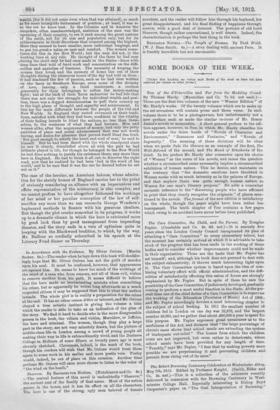The Care Committee, the Child, and the Parent. By Douglas.
Pepler. (Constable and Co. 2s. 0(1. net.)—It is scarcely five. years since the London County Council inaugurated its plan of attaching a "Care Committee" to every elementary school, but the moment has certainly arrived at which it is advisable to take stock of the progress that has been made in the working of these bodies and to consider whether improvements could not be made in their organization. These are the tasks that Mr. Pepler has set himself; and, although his book does not pretend to deal with the subject exhaustively, it throws much interesting light upon it. The Care Committee system is based upon the idea of com- bining voluntary effort with official administration, and the diffi- culties of satisfactorily effecting this tuflon of forces are strongly emphasized by Mr. Pepler. But in spite of them he sees the possibility of the Care Committee, if judiciously developed, gradually coming to perform a most useful function in the State. At the pre- sent time one of the chief duties of a Care Committee is to supervise the working of the Education (Provision of Meals) Act of 1906 ; and Mr. Papier accordingly devotes a most interesting chapter to the subject of school feeding. In 1911 the smallest number of children fed in London on one day was 25,876, and the largest number 49,983, and we gather that about £80,000 a year is spent for• this purpose. Mr. Fepler expresses great uneasiness as to the usefulness of the Act, and declares that " the large percentage of chronic cases shows that school meals are extending the system of inadequate out-relief." The homes from which the children come are not improved, but seem rather to deteriorate, where school meals have been provided for any length of time. "Frankly," says Mr. Fepler, "I fear that by making poverty more possible we are perpetuating it and preventing children and parents from rising out of its mire."










































 Previous page
Previous page